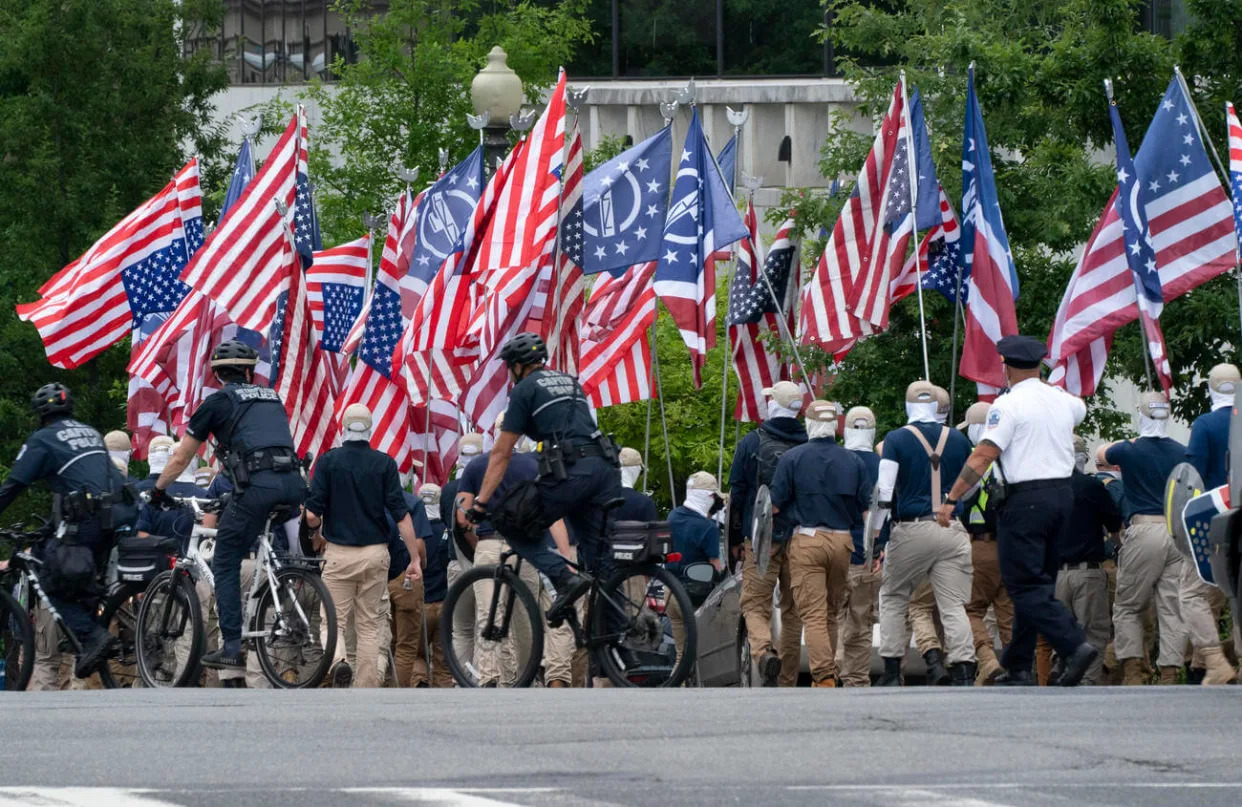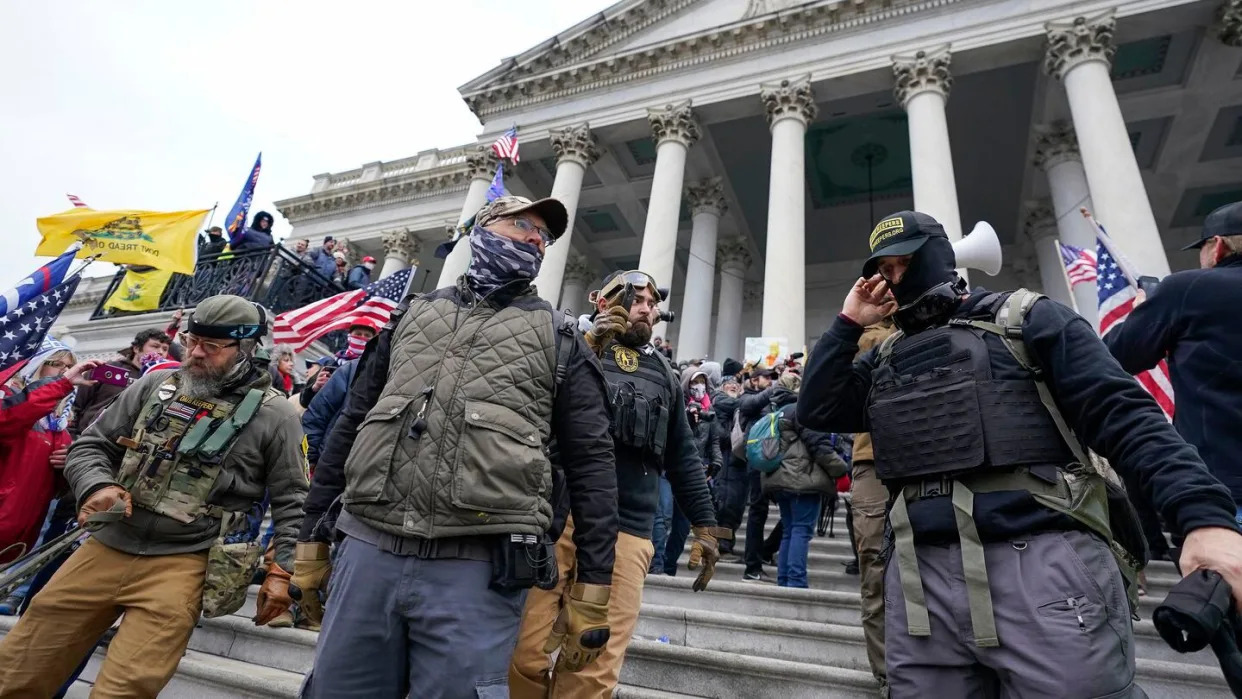Konstantin Toropin
Fri, December 1, 2023

An annual Pentagon report on extremism within the ranks reveals that 78 service members were suspected of advocating for the overthrow of the U.S. government and another 44 were suspected of engaging or supporting terrorism.
The report released Thursday by the Defense Department inspector general revealed that in fiscal 2023 there were 183 allegations of extremism across all the branches of military, broken down not only into efforts to overthrow the government and terrorism but also advocating for widespread discrimination or violence to achieve political goals.
The statistics indicate the military continues to grapple with extremism following its public denunciations and a stand-down across the services ordered by Defense Secretary Lloyd Austin in 2021. Furthermore, the numbers do not make it clear whether the military's approach is working. In 2021, the year the data was first released to Congress, there were 270 allegations of extremist activities. In 2022, that figure dropped to 146 before rebounding over the past year.
The Army had the most allegations in fiscal 2023 with 130 soldiers suspected of participation in extremist activity. The Air Force suspected 29 airmen; the Navy and Marine Corps reported 10 service members each. For the first time, the inspector general also reported numbers for the Space Force as a separate entity from the other services -- it suspected four Guardians of extremism.
The IG report also included instances of alleged criminal gang activity: There were 58 allegations of gang activity across the military.
However, the report did note that, out of all the suspected extremism and criminal gang activity, 68 of the total cases were investigated and cleared or deemed unsubstantiated.
In the U.S., extremist activity, including neo-Nazi, white supremacist and anti-government movements, has been growing, and numerous violent plots by veterans and even active-duty troops have been thwarted in recent years. Experts on extremist movements have warned about the growing potential of more violence and future attacks, similar to the Oklahoma City federal building bombing in 1995 that killed 168 and was carried out by an Army veteran.
In February, a former National Guardsman, Brandon Russell, who founded the Atomwaffen Division, a neo-Nazi hate group, was charged with plotting to blow up Baltimore's electrical grid and cause as much suffering as possible. Russell, who allegedly kept a framed photo of Oklahoma City bomber Timothy McVeigh, was sentenced to five years in prison in 2018 after an arrest in Florida for possessing explosives.
In the wake of the Jan. 6 siege of the U.S. Capitol building, the Pentagon tried to make a show of dealing with the problem of extremism among troops after it became clear that veterans as well as some active-duty troops were among the mob that stormed the halls of Congress in an effort to halt the certification of the 2020 election.
Military.com has reported that many of those efforts -- including the military-wide extremism training stand-down ordered by Austin -- were largely symbolic and were widely considered as just another box for commanders to check.
One active-duty noncommissioned officer said that, aside from the fact that no one was paying attention at the stand-down briefing he attended, the commander giving the lecture was "talking about what he thought were radical groups like Black Lives Matter."
The idea that far-left groups are just as problematic as far-right ones is a popular talking point among conservatives and Republican lawmakers. However, law enforcement officials and experts who study the topic have consistently noted that far-right groups espousing anti-government and white supremacist views are the biggest threat to the U.S. today.
The report also revealed that other efforts such as screening prospective recruits before enlistment are not working as well as intended.
Some recruiters did not complete all of the screening steps and "as a result, military service recruiters may not have identified all applications with extremist or criminal gang associations," according to the inspector general report.
"Further, the audit found that one military service entered data indicating applicants disclosed extremist or gang associations even though the applicants had not made such disclosures," the IG said, but it did not reveal which of the services falsely accused some of its recruits of having extremist ties.
What the report does make clear, however, is that when allegations are made, they are being referred for investigation, and when allegations are substantiated, some action is taken.
Of all the extremist and gang activity allegations, 135 were reported to military or civilian law enforcement, and 109 of the allegations were reported to another DoD organization or official.
Furthermore, 69 of all the allegations were substantiated at the time the report was written and the vast majority of those -- 50 -- were handled through administrative actions. That included involuntary discharge for 19 and counseling in three instances, while 17 more were handled by nonjudicial punishment and two went to court-martial.
There were no substantiated cases of extremism or gang activity where no action was taken.
While these figures, compared with the overall size of the services, are small, research and experts say that military service members and veterans pose an outsized danger to communities when they go down the path of extremism, given their increased familiarity with firearms and ability to organize and plan effectively.
In 2020, an Air Force sergeant at Travis Air Force Base in California pulled up to a federal courthouse in Oakland, California, in a white van and opened fire on security guards, killing one before going on the run and murdering a county sheriff's deputy a week later as part of a larger plan to incite a civil war.
Also in 2020, members of a group that included two Marines and styled itself as a "modern day SS" were arrested on allegations that they were plotting to destroy the power grid in the northwest. U.S. court records in that case say members discussed recruiting other veterans, stole military equipment, asked others to buy explosives, and discussed plans to manufacture firearms.
-- Konstantin Toropin can be reached at konstantin.toropin@military.com. Follow him on X at @ktoropin.
Related: What the Pentagon Has, Hasn't and Could Do to Stop Veterans and Troops from Joining Extremist Groups
Problems persist with how services report extremism, DOD watchdog says
Nikki Wentling
Fri, December 1, 2023

Manuel Balce Ceneta
The Defense Department investigated 183 allegations of extremist activity among service members in the past year, including 78 cases of troops advocating for the overthrow of the U.S. government, according to a report published Thursday by a Pentagon watchdog.
New findings from the Pentagon’s Office of Inspector General reveal DOD investigated 37 more cases of extremism this year than in 2022, which was the first year the IG issued a report on the subject. Congress mandated in 2021 that the IG annually gauge how effectively the Defense Department prevents and responds to extremist activities in the ranks.
The report’s findings show ongoing issues with how the services track and report data, which in turn makes measuring the military’s response challenging. While the Army, Navy and Air Force reported the number of allegations that were investigated, the departments did not track how many allegations of extremist activity were received but not investigated, the IG found.
“Tracking of allegations not referred for inquiry or investigation is challenging, impacting data accuracy,” the IG’s office said in a news release Thursday. “The report highlights ongoing challenges in compiling and validating data, emphasizing the need for consistent implementation of data collection.”
Earlier this year, the IG’s office found that the Army, Navy and Air Force each had a different reporting structure and used different electronic systems for reporting allegations of extremism.
The Army uses several independent databases to collect information, “making it impossible to track” the number of allegations that weren’t referred for investigation, the report states.
The Air Force also lacks a single reporting system, and the Air National Guard was inconsistent at reporting allegations it received because of the complexity of cases in which members weren’t activated at the time of the alleged misconduct.
The Navy said reporting the data to the IG was “time consuming” and that multiple policies “created confusion.” The sea service also cited concerns about compromising the privacy of troops.
All services are in the process of implementing a standardized system to streamline how data is collected and reported, the analysis said. The new process includes notifying the IG’s office about new allegations and reporting whether the allegations are referred for investigation.
The system is also designed to notify the IG about decisions on whether the allegations are substantiated and what punishments are doled out. The report didn’t say when that new process is expected to go into effect.
Though the information was difficult to compile and validate, the IG’s office did report a breakdown of allegations that were investigated from Oct. 1, 2022, through Sept. 30, 2023. During that period, the Defense Department investigated 58 allegations of gang activity, in addition to the 183 cases of extremism.
Of those 275 total allegations, 68 were not substantiated and 136 are open cases. Sixty-nine of the allegations led to service members receiving some sort of punishment, including two courts-martial and 19 involuntary discharges. The report did not specify what types of allegations led to disciplinary measures.
In addition to the 78 allegations involving troops wanting to overthrow the US government, the 183 cases of extremist activity included 44 instances of service members advocating for terrorism and 22 cases of service members advocating for or committing violence to achieve political, religious or discriminatory goals.
Three allegations were made about troops advocating for or committing violence to deprive people of their rights, and 32 allegations centered on troops advocating for widespread discrimination of people based on race, religion, sex, gender identity or sexual orientation.
The final four allegations involved service members encouraging other military personnel or DOD civilians or contractors to break the law or disobey orders in order to disrupt military activities.
This story was produced in partnership with Military Veterans in Journalism. Please send tips to MVJ-Tips@militarytimes.com.
No comments:
Post a Comment